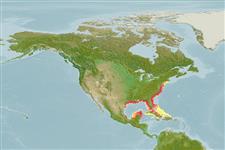Common names from other countries
>
Scombriformes (Mackerels) >
Scombridae (Mackerels, tunas, bonitos) > Scombrinae
Etymology: Scomberomorus: Latin, scomber = mackerel + Greek, moros = silly, stupid (Ref. 45335).
More on author: Mitchill.
Environment: milieu / climate zone / depth range / distribution range
Sinh thái học
Biển; Ở đại duơng, biển (Ref. 51243); Mức độ sâu 10 - 35 m (Ref. 26912). Subtropical; 20°C - 30°C (Ref. 54882); 44°N - 19°N, 97°W - 64°W (Ref. 54882)
Western Atlantic: Canada (Ref. 5951) to Cape Cod to Miami (USA) and Gulf of Mexico coasts from Florida, USA to Yucatan, Mexico. Three species namely: Scomberomorus tritor in eastern Atlantic, Scomberomorus sierra in eastern Pacific, and Scomberomorus brasiliensis in the Caribbean and Atlantic coast of South America have often been confused with this species. Absent in the Bahamas (Ref. 26938).
Length at first maturity / Bộ gần gũi / Khối lượng (Trọng lượng) / Age
Maturity: Lm 40.5, range 25 - 51.2 cm
Max length : 91.0 cm FL con đực/không giới tính; (Ref. 40637); Khối lượng cực đại được công bố: 5.9 kg (Ref. 40637); Tuổi cực đại được báo cáo: 5 các năm (Ref. 72462)
Các tia vây lưng cứng (tổng cộng): 17 - 19; Các vây lưng mềm (tổng cộng): 17-20; Tia mềm vây hậu môn: 17 - 20; Động vật có xương sống: 51 - 53. Interpelvic process small and bifid. Lateral line gradually curving down toward caudal peduncle. Vertebrae 21-22 precaudal plus 30-31 caudal, total 51-53. Intestine with 2 folds and 3 limbs. Swim bladder absent. Body covered with small scales. First dorsal fin black anteriorly and at distal margin posteriorly. Generally silvery with sides marked with about three rows of round to elliptical dark spots (orange in life).
Migrates in large schools over great distances along the shore. Larvae are found in surface waters between 19.6° and 29.8°C with salinities of 28.3 to 37.4 ppt. Feeds mainly on small fishes (clupeoids and anchovies), few quantities of penaeoid shrimps and cephalopods. Casting, live-bait fishing, jigging, and drift fishing are also employed in capturing this species. Aerial spotting is sometimes used in locating the fish. Marketed fresh, frozen or smoked; eaten pan-fried, broiled and baked.
Collette, B.B. and C.E. Nauen, 1983. FAO Species Catalogue. Vol. 2. Scombrids of the world. An annotated and illustrated catalogue of tunas, mackerels, bonitos and related species known to date. Rome: FAO. FAO Fish. Synop. 125(2):137 p. (Ref. 168)
IUCN Red List Status (Ref. 130435)
CITES (Ref. 128078)
Not Evaluated
Threat to humans
Reports of ciguatera poisoning (Ref. 31172)
Human uses
Các nghề cá: tính thương mại cao; cá để chơi: đúng
Các công cụ
Special reports
Download XML
Các nguồn internet
Estimates based on models
Preferred temperature (Ref.
115969): 22.9 - 26.8, mean 24.1 (based on 132 cells).
Phylogenetic diversity index (Ref.
82804): PD
50 = 0.5000 [Uniqueness, from 0.5 = low to 2.0 = high].
Bayesian length-weight: a=0.00794 (0.00647 - 0.00975), b=3.02 (2.98 - 3.06), in cm Total Length, based on LWR estimates for this species (Ref.
93245).
Mức dinh dưỡng (Ref.
69278): 4.5 ±0.5 se; based on diet studies.
Thích nghi nhanh (Ref.
120179): Trung bình, thời gian nhân đôi của chủng quần tối thiểu là 1.4 - 4.4 năm (K=0.2-0.38; tm=2-3; Fec=280,000).
Prior r = 0.68, 95% CL = 0.45 - 1.02, Based on 2 stock assessments.
Fishing Vulnerability (Ref.
59153): Moderate vulnerability (39 of 100).
Climate Vulnerability (Ref.
125649): High vulnerability (63 of 100).
